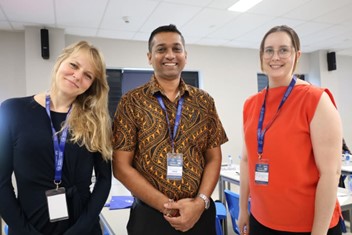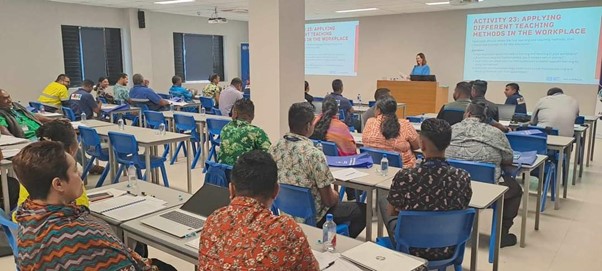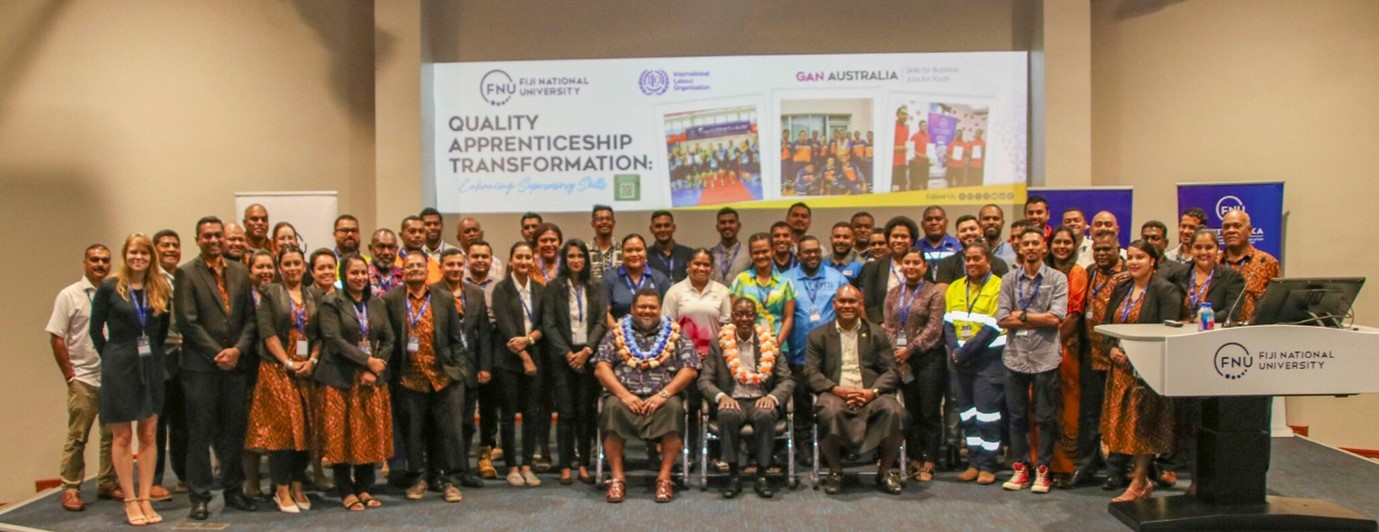Upskilling supervisors of apprentices in Fiji
Supervisors play an important role in the journey of an apprentice, impacting on their career from the commencement of the apprenticeship. Recognising this important role for supervisors, the International Labour Organization (ILO) in collaboration with Fiji National University (FNU) decided to roll out training for supervisors that would enhance their skills and result in better quality apprenticeships.

Shown in photo: Helen Kirsh ILO Pacific, Alvin Lal Fiji National University, Peta Skujins GAN Australia
GAN Australia worked with the ILO and FNU to develop and deliver a training product for supervisors of apprentices in Fiji. The project would leverage the ILO Recommendation for quality apprenticeships and related In-company trainers facilitation guide, along with resources from FNU.
FNU are the apprentice regulator in Fiji, responsible for the Contract of Apprenticeship, registration of eligible employers, regular inspections, and mentoring and support for apprentices and employers.
“Addressing the increasing demand for skilled workers through initiatives like the Quality Apprenticeship Transformation, is imperative to addressing one of Fiji’s main obstacles to economic development. By partnering with FNU, the ILO and GAN are committed to tailoring the training to meet the unique needs of employers and the workforce in Fiji, ensuring that apprenticeship programs are both relevant and impactful.” Mr Martin Wandera
Training modules
The training was split into four modules to meet the requirements of the ILO and priorities of the FNU. Training content was designed to be relevant to supervisors across broad business roles, including direct line supervisors, managers, and HR staff.
Module 1: About apprenticeships gave a background to the Fiji National Apprenticeships Scheme, and comparison with international apprenticeship systems.
Module 2: Workplace supervision covered the core role of the supervisor in managing staff, working with apprentices and entry-level workers, and focused on communication skills.
Module 3: Safety and inductions looked at the importance of safety and hazard identification, using inductions and onboarding to create a safe work environment, and psychosocial safety in the workplace.
Module 4: Training apprentices examined the role of the training provider, teaching and learning principles, assessment and performance, and embedding learning into work.

Training delivery
For the inaugural delivery of the training a formal welcome was hosted by FNU. Guest speakers included Dr. Isimeli Tagicakiverata, Pro-Vice-Chancellor TVET at FNU, Mr. Martin Wandera, Director of the ILO Office for Pacific Island Countries, and Mr. Edward Bernard, CEO of the Fiji Commerce and Employers Federation.
“FNU welcomes new employers into the scheme and is expanding apprenticeship offerings to include areas such as information technology, occupational health and safety, hospitality, white-collar occupations, and higher-degree apprenticeships.” Dr Isimeli Tagicakiverata
More than 50 participants attended the training session, from a range of industries including manufacturing, automotive, energy supply, and construction. While some supervisors had 20+ years of experience working with apprentices, others were at the initial stages of starting their apprenticeship programs. Many had gone through an apprenticeship to become qualified in their trade, with both positive and negative experiences with their own supervisors.
Feedback from participants was extremely positive, with several participants requesting the training is made available to their workplace in 2025, with consensus that the training should be made available to all registered employers.
Reflections
The Fijian apprenticeships system has many similarities with the Australian system, with both countries having a focus on increasing the quality of apprenticeships. This ILO and FNU project identified an area for improvement in the Fijian system and rapidly developed a solution that meets the needs of stakeholders.
The themes that emerged during training such as working with gen z, pressures related to priorities in the workplace, and a lack of knowledge of available supports, are similar to those often discussed within the Australian system. Supervisors were enthusiastic to improve their skills and the apprenticeship programs in the workplace, eagerly engaging with the training content.
By providing this training, FNU is able to proactively support businesses to improve their apprenticeship programs, supervisors to improve their skills, and are therefore impacting on the quality of apprenticeships across the country.
Find out more about this project
The ILO has promoted this training course through the ILO website. The FNU has promoted the training on their LinkedIn and Facebook pages.






